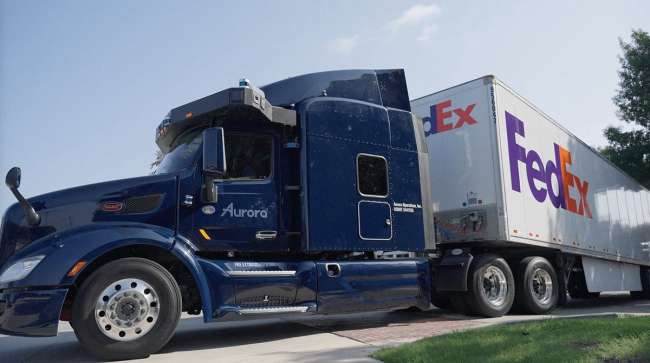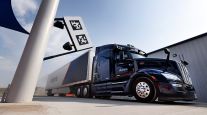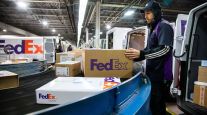Contributing Writer
FedEx, Paccar, Aurora Launch Autonomous Trucking Pilot

[Stay on top of transportation news: Get TTNews in your inbox.]
Aurora Innovation Inc., Paccar Inc. and FedEx Corp. launched a commercial pilot of autonomous trucking in Texas.
The companies said they started using a Paccar tractor equipped with self-driving technology to haul FedEx loads between Dallas and Houston, a 500-mile round trip, along the I-45 corridor Sept. 21.
Although the truck will be driving itself, the test program will have a safety driver in the cab, ready to take over operations if needed. But that backup is scheduled to end, said Aurora, which develops self-driving technology for heavy-duty trucks and passenger cars used for ride-hailing. The Mountain View, Calif., company calls its primary system Aurora Driver.
We’re launching an industry-first commercial pilot with @FedEx & PACCAR. Starting this week, we’re autonomously hauling FedEx loads in Texas to improve the safety & efficiency of FedEx’s massive transportation network with the Aurora Driver: https://t.co/Wdb3JCyIJt — Aurora (@aurora_inno) September 22, 2021
“At the end of 2023, we will launch our trucking business and haul loads autonomously between terminals without a safety driver,” the company said in a Sept. 22 blog post.
“Developing our trucking service and driver-as-a-service business model alongside a trusted network that understands how to safely optimize logistics through efficiency and speed primes us to build a more deeply integrated service with the Aurora Driver for fleets safely and quickly,” the company said.
In January, Aurora and Paccar reached an agreement to develop and sell autonomous versions of two of the truck company’s most popular Class 8 truck models, including the Peterbilt 579 and Kenworth T680 trucks.
“The speed and quality of progress we’re making with Aurora to develop self-driving trucks is impressive. This industry collaboration is an important step toward delivering these trucks at scale,” said John Rich, Paccar’s chief technology officer.
FedEx said the pilot program fits with its “future-ready” strategy.

Yeung
“This is an exciting, industry-first collaboration that will work toward enhancing the logistics industry through safer, more efficient transportation of goods and we are pleased to collaborate with other industry leaders – Aurora and Paccar – on this endeavor,” said Rebecca Yeung, vice president of advanced technology and innovation at FedEx Corp.
The company said autonomous trucking is one tool to safely and efficiently deal with “the exponential growth of e-commerce.”
Sterling Anderson, co-founder and chief product officer at Aurora, said one of the benefits of the collaboration is to test autonomous driving with companies that operate at scale. Adding FedEx to the collaboration will incorporate logistics expertise and help accelerate the deployment, the companies said.
Real-world tests such as this latest venture demonstrate that autonomous driving is moving forward slowly, said Mike Ramsey, the automotive and smart mobility analyst at Gartner Inc.
“It’s exciting to see the new pilots being announced, but I expect we are still a few years away from taking people out of the seat. The stakes are high, with 80,000-pound vehicles going 60 mph. The regulations between different states are uneven, and clarity about legality and safety will need to be codified in some way,” Ramsey told Transport Topics.
I expect we are still a few years away from taking people out of the seat. The stakes are high, with 80,000-pound vehicles going 60 mph.
Mike Ramsey, automotive and smart mobility analyst at Gartner Inc.
He expects the industry to settle into a business model in which companies such as Aurora provide the driver technology and associated software, including high-definition maps. The logistics companies will own and operate the vehicles.
“So you can imagine buying a truck fitted with a Via or Aurora driver, and the logistics firms or big consumer goods fleets will pay Aurora or Via to make sure the software and hardware are working on the truck,” Ramsey said.
Aurora also is working with other companies. It has partnered with Volvo Group to develop autonomous trucks.
Other autonomous trucking technology companies are looking at Texas to launch autonomous trucking operations. Companies have said that the state’s extensive highway network and sunny weather make it an ideal development and testing site.
Earlier this month, autonomous truck developer Embark announced a partnership with Ryder to launch a network of up to 100 freight transfer points. Ryder will provide yard operations, maintenance and fleet management to support a coast-to-coast autonomous network for Embark fleet partners, the companies said Sept. 16.

Drivers want good health and education on emerging technologies. Paul Beavers of PCS Software and Dr. Bethany Dixon of Drivers Health Clinic share their insights. Hear a snippet above, and get the full program by going to RoadSigns.TTNews.com.
The network would create transfer points where freight can be moved from the “middle mile” of driverless longhaul trucks to driver-enabled trucks for first- and last-mile delivery.
Elsewhere, autonomous truck developer TuSimple is working with Navistar to field a fleet of about 50 trucks on interstate routes in the Southwest, connecting cities in Arizona and Texas. The company said it plans to expand across major shipping lanes throughout the country by 2024.
Meanwhile, American Trucking Associations and others are pushing the federal government to develop guidelines to allow for autonomous trucking.
ATA, along with a dozen other stakeholder groups, urged Transportation Secretary Pete Buttigieg to move forward on implementing a national framework for the development and deployment of automated vehicles.
“Implementing a federal AV framework that fosters the safe deployment of AVs can help the Biden administration to shepherd in a safer, more environmentally friendly and accessible transportation future,” the trucking federation and a dozen other organizations wrote in a Sept. 20 letter to Buttigieg.
“ATA believes there is great promise in automated vehicle technology to improve highway safety, the efficiency of our supply chain and our environment,” President Chris Spear said. “But we need a national framework that fosters innovation, not a patchwork of potentially conflicting state and federal regulations, to deliver on that promise.”
Want more news? Listen to today's daily briefing below or go here for more info:





